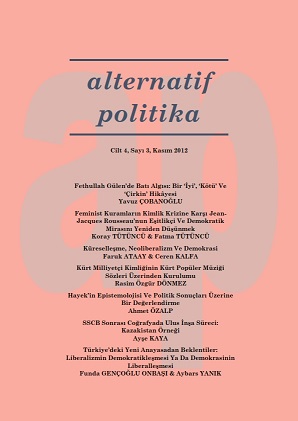Hayek’in Epistemolojisi Ve Politik Sonuçlari Üzerine Bir Değerlendirme
An Evaluation on the Epistemology of Hayek and its Political Implications
Author(s): Ahmet ÖzalpSubject(s): Epistemology, Political Philosophy, Social Philosophy
Published by: Rasim Özgür DÖNMEZ
Keywords: Constructivist Rationalism; Evolutionary Rationalism; Spontaneous Order; Planned Economy;
Summary/Abstract: Although not an anti-rationalist, Hayek established his discourse against constructivist rationalism. He distinguished between two kinds of rationalism: evolutionary rationalism and constructive rationalism. Hayekian epistemology emphasised the interest in evolutionary rationalism by criticizing the constructive rationalism. Evolutionary rationalism (or British tradition) is based on the interpretation of traditions and institutions that have spontaneously developed. Meanwhile, constructive rationalism, which emerged in France, is known as French tradition. Constructivist rationalism has aimed at constructing a utopia according to some assumptions about the unlimited powers of human reason. Hayek’s economic and political thoughts are part of or a prolongation of this epistemology. In parallel with this epistemology, the political structure proposed by Hayek is a limited state and the restriction of any power. We aim to explain the relationship between Hayek’s important key concepts—namely, anti-constructivism and spontaneous order. Hayek’s main thesis is that even a small intervention in spontaneous order, such as free market or great society through planning (or anything else), might lead to the destruction of freedom. In addition, Hayek established his theory against a welfare state containing the concept of planning. His emphasis has been reflected as a defence of the free market concept and the critics of planning or interfering in the state. According to Hayek, political power or the state behaves according to the rules.
Journal: Alternatif Politika
- Issue Year: 4/2012
- Issue No: 3
- Page Range: 342-353
- Page Count: 12
- Language: Turkish

